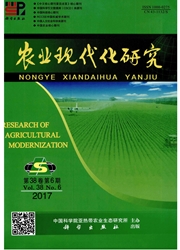

 中文摘要:
中文摘要:
当前我国土地规模化流转背景下,农业雇工在缓解农村富余劳动力就业压力和满足规模化经营需要两方面发挥了重要作用。基于黑龙江省412份农户样本数据,建立Logistic回归模型分析农业雇工受雇意愿及影响因素。结果表明,愿意成为农业雇工的女性比例明显高于男性,占58.35%;年龄在50岁以上的农民受雇意愿最高,达55.62%。年龄、土地转出、家庭农业劳动力数量以及家庭农业收入比重对农业雇工受雇意愿有显著的正向影响;是否具有非农技能、家庭耕地面积、土地转入和期望劳动工资等因素对农业雇工受雇意愿有显著的负向影响;期望劳动合同形式和期望劳动地点对农业雇工受雇意愿没有明显影响。基于此,建议建立农村闲散劳动力用工平台,加强农业雇工劳动技能培训;培养新型农业经营主体,优化农村富余劳动力就业结构;完善农业雇工社会保障机制,提高农业雇工劳动保障意识,保障农业雇工权益。
 英文摘要:
英文摘要:
In the context of large-scale rural land circulation, rural labors are playing an important role in reducing employment pressure for rural labor surplus and developing agricultural scale management. Based on the survey data of 412 households in Heilongjiang Province and applying the Logistic Regression Model, this paper analyzed the willingness of rural labors’ employment and its influencing factors. Results show that women were more willing to work in the agricultural industry than men, accounting for 58.35% and farmers over 50 years old were more willing to work in the agricultural industry than young farmers, accounting for 55.62%. In addition, the age, rural land transferring out, the number of labors in the household, the income share from agriculture had significant positive impacts on the willingness of rural labors to work in the agricultural industry. Whether possessing non-agricultural skills, the size of arable land of the household, rural land transferring in, expected wages had significant negative impacts on the willingness of rural labors to work in the agricultural industry. While the desired labor contract form and the expected working location had on significant influence on the willingness of rural labors to work in the agricultural industry. Therefore, to improve the employment situation in rural areas, this paper provides the following suggestions: establishing the platform of idle rural labors, strengthening the skill training of rural labors to improve the efficiency of human resources in rural areas, cultivating new agricultural operators to optimize the employment structure of the rural labor surplus, improving the social security mechanism to improve the security awareness of rural labors and to protect employee rights.
 同期刊论文项目
同期刊论文项目
 同项目期刊论文
同项目期刊论文
 期刊信息
期刊信息
